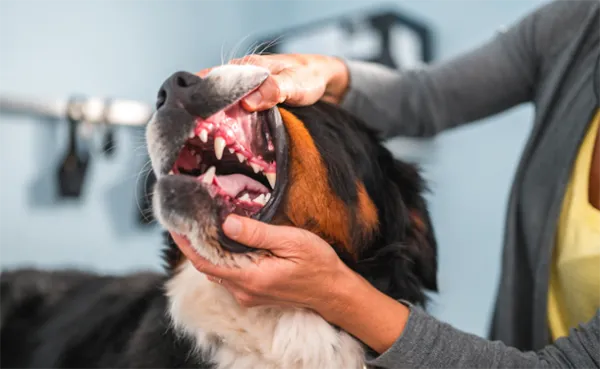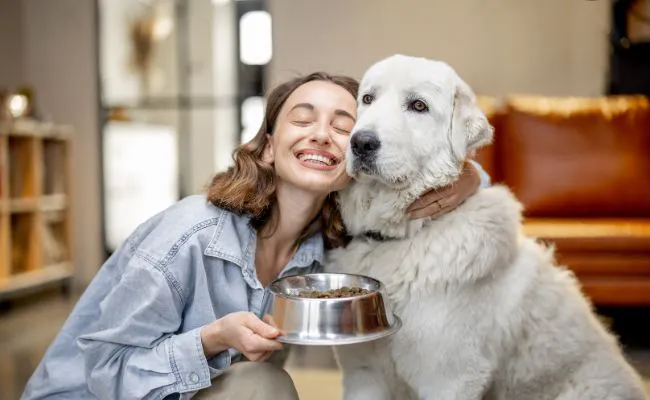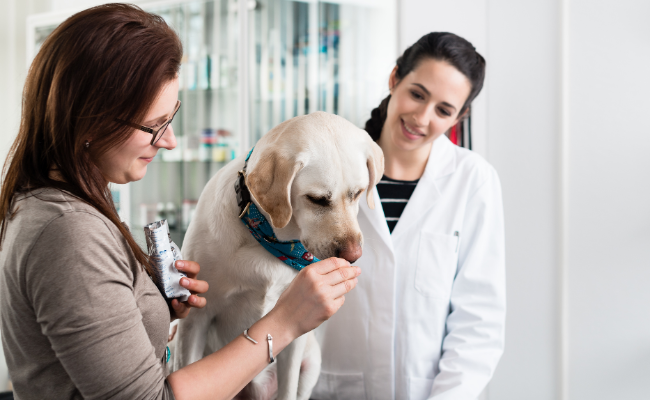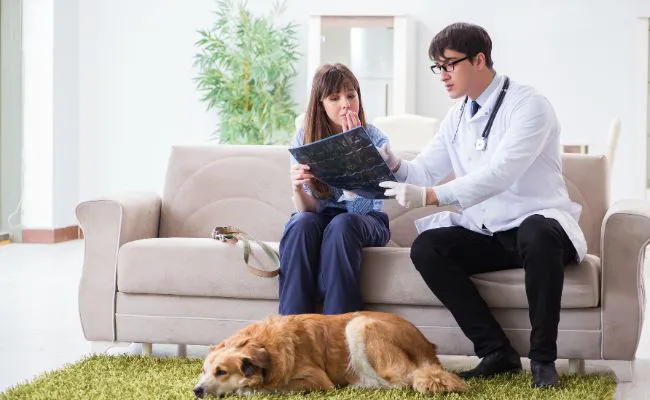
Seeing your dog skip meals can definitely be concerning. When you notice your dog not eating, it’s natural to wonder what’s going on. This situation, often referred to as a “dog not eating,” can have various causes. It might be something as simple as a lack of appetite, or it could signal a need for veterinary attention. Our goal is to guide you through this with a friendly, informative approach, providing useful tips and straightforward steps to help get your furry friend back to their food-loving self. After all, seeing them happy and healthy is what we all want, right? So, let’s dive in and tackle this issue together, ensuring plenty of pats and treats along the way!
As a vet, it’s quite common to encounter concerned pet owners whose dogs show less interest in food. Let’s explore some of the most common causes behind a dog not eating, offering insights from a veterinary perspective to help you understand and address these issues when possible.
Why Dog Not Eating

1. Gastric Problems
Gastric problems in dogs are a common issue that veterinarians encounter, which can significantly impact a dog’s desire to eat. These problems can vary widely in severity and cause, from mild and temporary discomforts to more serious, chronic conditions that require medical intervention.
i) Mild Gastric Issues
On the milder end of the spectrum, a dog might experience an upset stomach due to dietary indiscretions. This term essentially covers the scenarios when dogs eat something they shouldn’t—whether it’s scavenging something from the trash, ingesting spoiled food, or eating too much of a non-toxic item that’s not part of their regular diet. These incidents can lead to temporary gastrointestinal upset characterized by a lack of appetite, mild vomiting, or diarrhea. In many cases, such issues can resolve on their own with a bit of care from the pet owner, like ensuring the dog stays hydrated and temporarily switching to a bland diet.
ii) Serious Gastric Conditions
On the more concerning end are conditions such as gastric ulcers and gastric cancer. Gastric ulcers are sores that develop on the stomach lining, which can cause significant discomfort, leading to a loss of appetite, visible distress, vomiting (sometimes with blood), and dark, tarry stools. These ulcers can be caused by prolonged use of certain medications, stress, or underlying health issues.
Gastric cancer, though less common, is a serious condition that can lead to a significant reduction in appetite among other symptoms. It can present with similar signs to other less serious gastric issues, such as vomiting and weight loss, making it crucial to investigate persistent symptoms thoroughly.
iii) Monitoring and Diagnosis
Monitoring additional symptoms alongside the loss of appetite is crucial in identifying the underlying cause of gastric problems. Vomiting, diarrhea, lethargy, or changes in behavior such as increased irritability or a noticeable decrease in activity level can all be indicative of the problem’s nature and severity.
If a dog shows persistent signs of gastric distress, especially if accompanied by a loss of appetite, it’s essential for them to be examined by a veterinarian. The vet may recommend diagnostic tests such as blood tests, X-rays, or ultrasounds to get a clearer picture of the dog’s condition and to rule out or confirm specific diagnoses. Early detection and treatment are key to managing gastric issues effectively, ensuring the health and well-being of the dog.
In short, gastric problems in dogs can range from minor, easily treatable issues to serious conditions that require immediate medical attention. A keen observation of your dog’s behavior and symptoms, followed by timely veterinary consultation, is the best approach to ensuring your pet remains healthy and happy.
Stress: A Hidden Culprit Behind Your Dog’s Lost Appetite

Stress in dogs, much like in humans, can have a profound effect on their physical health and emotional well-being, including their appetite. When dogs are stressed, their bodies react in ways that can diminish their desire to eat. Understanding the various triggers of stress and how to manage them can help your dog overcome a loss of appetite and maintain a healthy lifestyle.
Stress Triggers in Dogs
Dogs can experience stress from a wide range of sources, and what stresses one dog might not affect another in the same way. Common stress triggers include:
- Environmental Changes: Moving to a new home is a significant change that can disrupt a dog’s sense of security and routine, leading to stress. Dogs are creatures of habit, and a new, unfamiliar environment can be overwhelming.
- Household Changes: The introduction of a new pet or a new family member (including babies) can also be a source of stress. Dogs may feel jealous or threatened, leading to anxiety. Similarly, the loss of a family member or another pet can cause grief and stress.
- Routine Disruptions: Even minor changes in the daily routine, such as a change in the time they’re fed, walked, or the time their owners return home, can stress some dogs.
Recognizing Stress in Dogs
Dogs communicate stress in various ways, and loss of appetite is just one sign. Other symptoms may include excessive panting, yawning, drooling, shedding, hiding, or showing signs of aggression. Recognizing these signs early is crucial in preventing the stress from escalating.
Managing Stress in Dogs
To help a stressed dog, it’s important to first identify and, if possible, minimize or eliminate the source of stress. Here are some strategies:
- Maintain a Routine: Keeping a consistent schedule for feeding, walks, and playtime can provide a sense of stability for your dog.
- Create a Safe Space: Ensure your dog has a comfortable, quiet place to retreat to when they feel overwhelmed. This could be a crate, a specific room, or a quiet corner with their favorite toys and bedding.
- Gradual Introduction: When introducing new pets or family members, do so gradually and in a controlled manner to allow your dog to adjust at their own pace.
- Exercise and Play: Regular physical activity and playtime can help reduce stress and anxiety, promoting overall well-being.
- Professional Help: If your dog’s stress seems to be severe or chronic, consulting with a veterinarian or a professional dog behaviorist can provide tailored strategies for managing stress. In some cases, medication or a special diet may be recommended.
Oral/Dental Problems

When a dog isn’t eating, oral or dental problems could be at the root of their reluctance. Just like in humans, dental issues in dogs can range from mildly uncomfortable to severely painful, affecting their ability and desire to eat. Let’s delve into the common dental issues that can impact a dog’s appetite and the importance of dental care in preventing these problems.
Common Oral/Dental Issues in Dogs
- Gum Disease (Periodontal Disease): This is one of the most common dental issues in dogs. It’s caused by the buildup of plaque and tartar at and below the gum line, leading to inflammation and infection of the gums. If left untreated, it can lead to pain, bad breath, and tooth loss.
- Tooth Decay: Although less common than in humans due to the nature of dog diets and tooth structure, dogs can still experience tooth decay. This can lead to cavities, toothache, and infection.
- Foreign Objects: Dogs are curious creatures and may chew on things that can get stuck in their mouth or between their teeth, such as sticks, bones, or toys. These objects can cause discomfort, pain, or even injury to the gums and teeth.
- Broken Teeth: Dogs that chew on hard objects like certain toys or bones can crack or break their teeth. Broken teeth can be very painful, especially if the break exposes the sensitive inner part of the tooth (the pulp).
Impact on Eating
When a dog experiences oral pain, it’s natural for them to lose interest in food. Chewing becomes painful, and they may refuse to eat or only eat very little. You might notice them dropping food from their mouth, chewing on one side, or crying out in pain while eating.
Importance of Regular Dental Care
Preventing dental issues is key to avoiding the pain and discomfort that can lead to a loss of appetite. Here are some steps you can take:
- Regular Dental Check-Ups: Just like humans, dogs benefit from regular dental check-ups with a veterinarian. These check-ups can catch problems early before they become more serious.
- Professional Cleanings: Veterinarians can perform professional cleanings to remove plaque and tartar buildup that brushing alone can’t eliminate.
- Home Dental Care: Regular brushing of your dog’s teeth with dog-specific toothpaste can significantly reduce the risk of dental problems. Dental chews and toys designed to clean the teeth can also help.
- Diet: Some dog foods are formulated to help reduce plaque and tartar buildup. Discuss with your vet about the best diet for your dog’s dental health.
Addressing and preventing dental issues in dogs not only helps maintain their oral health but also ensures they can continue to enjoy their meals without pain. If you suspect your dog has a dental problem, it’s important to consult with your veterinarian as soon as possible to get the appropriate treatment. Early intervention can prevent more serious issues and help keep your furry friend happy, healthy, and eager for mealtime.
Motion Sickness

When your dog isn’t eating, it could be due to a variety of reasons, including the after-effects of vaccination or motion sickness from travel. Both scenarios can cause discomfort or distress, leading to a temporary loss of appetite. Let’s explore these issues in more detail and discuss strategies for prevention and care.
Dog Not Eating After Vaccination
Vaccinations are crucial for protecting your dog against various diseases. However, it’s not uncommon for dogs to experience mild side effects following vaccination, which can include lethargy, mild fever, and a reduced appetite. These reactions are typically short-lived, lasting no more than 24 to 48 hours as the dog’s immune system responds to the vaccine.
If your dog is not eating after receiving a vaccine, consider the following:
- Provide Comfort: Ensure your dog is comfortable and has a quiet place to rest.
- Stay Hydrated: Encourage your dog to drink water to stay hydrated. If they’re reluctant, try offering ice cubes or a low-sodium chicken broth.
- Monitor Symptoms: While mild reactions are normal, if you notice more severe symptoms like persistent vomiting, diarrhea, swelling, or difficulty breathing, contact your veterinarian immediately, as these could indicate a more serious reaction to the vaccine.
Dog Not Eating Due to Motion Sickness
Travel can be a challenging experience for some dogs, with motion sickness being a common issue. The primary symptoms of motion sickness include nausea, drooling, yawning, whining, and vomiting, which can understandably lead to a lack of interest in food.
To help manage motion sickness and its impact on your dog’s appetite, consider the following strategies:
- Acclimatization: Gradually acclimatize your dog to car travel by taking short trips and gradually increasing the duration as they become more comfortable.
- Fasting Before Travel: Avoid feeding your dog immediately before travel. A light meal a few hours before departure can help minimize nausea.
- Use of Medication: Consult your vet about medications or supplements that can help prevent or reduce the symptoms of motion sickness.
- Travel Position: Some dogs experience less nausea when they can see out of the windows. Safe, secure harnesses or carriers that elevate your dog can help.
- Frequent Breaks: On longer trips, take regular breaks to allow your dog to get some fresh air and exercise.
- Comfort Items: Bringing along your dog’s favorite toy or blanket can provide comfort and help reduce anxiety.
In both scenarios, it’s important to monitor your dog closely and provide supportive care to help them recover from their temporary loss of appetite. If your dog continues to refuse food for more than 24 hours or if you have any concerns about their health, it’s best to consult with your veterinarian for further advice and treatment. Remember, while a temporary decrease in appetite can be normal under these circumstances, ongoing support and monitoring are key to ensuring your dog’s well-being.
Change in Feed

A change in feed is a common scenario that can lead to a dog not eating. Dogs, much like humans, can have their own dietary preferences and may react negatively to sudden changes in their food. This can be due to differences in taste, texture, or even how the new food makes them feel. To ensure a smooth transition and prevent your dog from skipping meals, a gradual approach to changing their diet is recommended.
Why Gradual Transition is Important
- Digestive Health: A sudden change in diet can upset a dog’s digestive system, leading to symptoms like diarrhea, vomiting, or constipation. Gradually introducing the new food allows the digestive system to adjust without causing distress.
- Acceptance: Gradually mixing the new food with the old helps the dog become accustomed to the taste and texture of the new diet. This can make them more likely to accept the new food as part of their regular meals.
- Nutritional Adjustment: Each type of dog food has a different nutritional profile. A gradual transition helps ensure that your dog’s body adjusts properly to the new balance of nutrients, vitamins, and minerals.
How to Transition Your Dog to a New Diet
- Start Slow: Begin by mixing a small amount of the new food with the old food. A good starting ratio is 25% new food to 75% old food.
- Gradually Increase: Over the course of 7 to 10 days, gradually increase the proportion of new food while decreasing the old food. You can adjust this to 50% new, 50% old, then 75% new, 25% old, and finally 100% new food.
- Monitor Your Dog: Keep an eye on your dog’s reaction to the new food, including their willingness to eat it and any signs of digestive discomfort. If your dog shows signs of distress, slow down the transition process, and consult with a veterinarian if necessary.
- Stay Consistent: Once the transition is complete, try to stick with the new diet without frequent changes. Consistency helps maintain your dog’s digestive health and overall well-being.
- Hydration: Ensure your dog stays well-hydrated throughout the transition process. Changes in diet can affect hydration levels, and adequate water intake is essential for maintaining health.
If your dog still refuses to eat the new food after a gradual transition, or if they show signs of health issues like prolonged diarrhea, vomiting, or lethargy, it’s important to consult with a veterinarian. They can rule out any underlying health problems and recommend a diet that suits your dog’s specific nutritional needs and preferences.
Remember, each dog is unique, and what works for one may not work for another. Patience and attentiveness to your dog’s needs and responses are key to successfully changing their diet while ensuring their happiness and health.
Recent Medication

When a dog is not eating after receiving medication or vaccines, it’s a situation that can understandably cause concern for pet owners. Medications, while often necessary for treating or preventing various conditions, can have side effects, one of which may be a temporary loss of appetite. This response can be due to the way the medication interacts with the dog’s body, potentially causing mild discomfort, nausea, or a general feeling of malaise that diminishes the dog’s interest in food.
Why Medications Affect Appetite
- Nausea and Discomfort: Just as humans can feel nauseous or off-balance after taking certain medications, dogs can experience similar sensations. These feelings can lead to a temporary disinterest in eating.
- Taste and Smell Sensitivity: Some medications may alter a dog’s sense of taste or smell, making food less appealing.
- Gastrointestinal Upset: Certain drugs can irritate the gastrointestinal tract, leading to symptoms like stomach ache or changes in bowel movements, which can also decrease appetite.
What You Can Do
- Observation: Keep a close eye on your dog’s eating habits and overall behavior after they start a new medication. Note any other symptoms that may accompany the loss of appetite, such as lethargy, vomiting, or diarrhea.
- Encourage Hydration: Ensure your dog stays hydrated, especially if they are eating less. Offer fresh water and consider providing wet food to help maintain fluid intake.
- Palatable Foods: To encourage eating, you might offer more palatable foods that are gentle on the stomach, such as boiled chicken and rice. However, consult your vet before making any significant dietary changes.
- Consult Your Vet: If the loss of appetite is persistent or if you observe other concerning symptoms, it’s crucial to contact your vet. They may adjust the dosage, switch medications, or offer treatments to counteract the side effects.
Monitoring and Communication
It’s important to monitor your dog closely after the introduction of new medications and to maintain open communication with your veterinarian. A temporary loss of appetite following medication is not uncommon and can be managed with care and attention. However, if the issue persists or is accompanied by other symptoms, it may require further investigation and intervention by a veterinary professional. Your vet can provide guidance based on the specific medication and your dog’s health history, ensuring that your dog returns to their normal self as quickly as possible.
Systemic Sickness/Infection

Systemic sickness or infection in dogs refers to illnesses that affect the entire body, not just a single area or organ. These conditions can significantly impact a dog’s health, leading to symptoms such as anorexia (loss of appetite), pain, fever, and a general sense of malaise. The lack of desire to eat, while concerning on its own, is often a sign of a deeper, more systemic issue that needs medical attention.
Common Systemic Conditions
- Viral Infections: Diseases like canine distemper or parvovirus are severe viral infections that can cause a wide range of symptoms, including fever, lethargy, vomiting, diarrhea, and loss of appetite.
- Bacterial Infections: Bacterial infections, such as leptospirosis, can affect multiple organs, leading to serious symptoms, including a high fever, jaundice, and anorexia.
- Chronic Diseases: Conditions like kidney disease, liver disease, or diabetes can lead to persistent or intermittent loss of appetite due to the discomfort and imbalance these diseases cause.
- Autoimmune Diseases: Autoimmune conditions, where the body’s immune system mistakenly attacks healthy cells, can lead to systemic inflammation, pain, and consequently, anorexia.
The Impact of Systemic Sickness on Appetite
When a dog experiences systemic illness, the body’s natural response is to fight the infection or disease, which can require a significant amount of energy. Pain, fever, and malaise are common symptoms of many systemic issues and can greatly diminish a dog’s interest in food. Anorexia in dogs can lead to a weakened state, making it harder for them to recover from the underlying condition.
Importance of a Veterinary Examination
A thorough veterinary examination is crucial for dogs showing signs of systemic illness, including loss of appetite. Diagnostic tests, such as blood work, urinalysis, imaging (like X-rays or ultrasound), and specific disease screenings, can help identify the underlying cause. Early detection and treatment are often key to a successful recovery. Treatments may include medications to fight infections, manage symptoms, or support the functioning of affected organs, along with dietary adjustments to meet the dog’s nutritional needs during their recovery.
Supporting Your Dog
Supporting a dog with a systemic illness involves closely monitoring their condition, ensuring they are comfortable, and following the veterinary care plan. Encouraging hydration, offering palatable, easy-to-digest foods, and providing a calm, comfortable environment can help support their recovery.
Understanding that systemic diseases and infections are serious conditions that affect the whole body highlights the importance of prompt veterinary care when a dog shows signs of anorexia and other related symptoms. With timely intervention and appropriate treatment, many dogs can recover from systemic illnesses, returning to their normal selves and regaining their appetite.
Old Age

As dogs enter their senior years, various physiological changes occur, one of the most notable being a slowdown in metabolism. This deceleration affects how their bodies process food, leading to a natural decrease in their daily caloric needs. Consequently, older dogs may not eat as much as they did in their younger years. While a diminished appetite in senior dogs can be a normal part of aging, it’s essential to carefully monitor their nutritional intake to ensure they’re receiving the balanced diet they need to maintain their health and quality of life.
Understanding the Nutritional Needs of Senior Dogs
- Reduced Caloric Requirement: Due to the slower metabolism, senior dogs require fewer calories to maintain their weight. Overfeeding can easily lead to obesity, which brings its own set of health problems, including joint stress, diabetes, and heart disease.
- Protein: High-quality protein is crucial for maintaining muscle mass in older dogs. However, the amount of protein needed can vary. Dogs with specific health issues might require adjustments in protein intake, which should be managed under veterinary guidance.
- Fiber: Increased dietary fiber can benefit senior dogs by supporting gastrointestinal health and aiding in weight management.
- Vitamins and Minerals: Adequate levels of specific vitamins and minerals, adjusted for their age and health status, support overall well-being, including bone health and immune function.
Monitoring and Managing Health through Diet
Regular veterinary check-ups are vital for monitoring the health of senior dogs. These visits can help identify any emerging health issues early on and allow for dietary adjustments to address specific concerns such as kidney function, joint health, or obesity. Your vet might recommend a specialized senior dog food that’s formulated to meet the nutritional needs of older dogs or dietary supplements to support their health.
Tips for Feeding Senior Dogs
- Appetite Stimulation: If your senior dog is less interested in eating, warming their food or adding a small amount of wet food can make it more appealing.
- Meal Frequency: Feeding smaller, more frequent meals can help older dogs better digest and utilize their food.
- Comfortable Eating: As dogs age, they may develop arthritis or other conditions that make bending down uncomfortable. Elevated feeding stations can make meal times more comfortable.
- Hydration: Ensuring your senior dog remains well-hydrated is crucial, as older dogs are more susceptible to dehydration. Always provide easy access to fresh water.
In all these cases, observing your dog and seeking veterinary advice early can make a significant difference in managing the issue effectively. Sometimes, a dog not eating can be a sign of a minor problem that’s easily remedied, while other times, it may indicate a more serious condition that requires prompt medical attention. Remember, you know your dog best, and if their behavior changes significantly, it’s always worth investigating further.
What to Do if Your Dog is Not Eating

When your dog turns their nose up at their food, it can be a source of worry and confusion. A loss of appetite in dogs can stem from a variety of causes, ranging from minor to serious. Here’s a step-by-step guide on how to approach the situation, ensuring your dog gets back to their happy, healthy self as soon as possible.
Step 1: Evaluate Any Changes in Environment or Routine
Dogs thrive on routine and can be sensitive to changes in their environment. Consider any recent changes that could be affecting your dog:
- Have you moved to a new home recently?
- Is there a new pet or person in the house?
- Have there been any changes in the household routine?
Sometimes, simply identifying and mitigating these stressors can resolve the issue.
Step 2: Inspect for Signs of Illness
Loss of appetite can often be the first sign of illness. Look for additional symptoms such as:
- Lethargy or unusual tiredness
- Vomiting or diarrhea
- Signs of discomfort or pain
- Changes in drinking habits
If you observe any of these symptoms alongside a lack of appetite, it’s time to consult your veterinarian.
Step 3: Consider Recent Dietary Changes
If you’ve recently changed your dog’s food, this could be the culprit. Dogs can be picky with their food, and a sudden switch can cause them to stop eating. To avoid this, always transition to new food gradually, mixing it with the old food over a period of a week or more.
Step 4: Check for Dental Issues
Oral health issues can make eating painful. Check your dog’s mouth for any signs of dental problems, such as:
- Bad breath
- Swollen or bleeding gums
- Loose or broken teeth
Dental issues require professional veterinary care, so make an appointment if you suspect this is the problem.
Step 5: Rule Out Medication Side Effects
If your dog has recently started new medication or was recently vaccinated, loss of appetite could be a side effect. Consult with your vet if you suspect this is the case. Often, this is temporary, but your vet may have suggestions to help stimulate appetite.
Step 6: Provide a Comfortable Eating Environment
Ensure your dog’s eating area is quiet, safe, and away from high traffic areas. Some dogs may feel vulnerable or distracted while eating, so creating a comfortable space can help encourage them to eat.
Step 7: Tempt Them with Tasty, Healthy Treats
Sometimes, tempting your dog with a little bit of something delicious can stimulate their appetite. Consider adding a small amount of chicken broth (ensure it’s onion-free) or a piece of cooked, unseasoned chicken to their food. However, these should be used sparingly to not encourage picky eating habits.
Step 8: Maintain a Regular Feeding Schedule
Consistency is key. Feeding your dog at the same times every day can help regulate their appetite and ensure they’re ready to eat when mealtime comes around.
Step 9: Visit the Veterinarian
If your dog’s loss of appetite persists for more than 24 hours or is accompanied by other concerning symptoms, it’s crucial to visit the vet. They can conduct a thorough examination and possibly recommend diagnostic tests to get to the root of the issue.
While a dog not eating can be concerning, it’s often a problem that can be resolved with careful observation and the right approach. Whether it’s a minor adjustment to their routine or environment, or a health issue that requires veterinary care, the most important thing is to act promptly and with your dog’s best interest at heart.
Mealtime Mastery: Keeping Your Dog Eager to Eat
Ensuring your furry friend enjoys their meals and maintains a healthy appetite can sometimes be a bit of a puzzle, but it’s crucial for their overall well-being. If you’ve noticed your dog turning their nose up at their dinner, don’t fret! Here’s a comprehensive guide to help minify (minimize) the chances of your dog not eating, ensuring they stay happy, healthy, and well-fed.
1. Consistency is Key
Dogs thrive on routine, including their feeding schedule. Feeding them at the same times every day helps regulate their body’s hunger cues. Consistency in the type of food you offer is also important, as frequent changes can make them picky eaters.
2. Quality of Food
The quality of your dog’s food plays a pivotal role in their appetite. Opt for high-quality, nutritionally balanced dog food that’s appropriate for their age, size, and activity level. Sometimes, the issue could be as simple as they don’t like the taste or texture of their current food.
3. Create a Peaceful Dining Experience
Just like us, dogs prefer to eat in a calm and comfortable environment. Ensure their feeding area is away from high-traffic parts of the home and that they can eat without being disturbed. Stress, noise, and competition from other pets can deter them from eating.
4. Check for Health Issues
A sudden loss of appetite could indicate health problems. Dental issues, gastrointestinal problems, or more serious conditions can make eating uncomfortable or reduce their desire to eat. Regular vet check-ups can help catch and treat these issues early on.
5. Limit Treats and Table Scraps
While it’s tempting to spoil your pooch, too many treats or human food can fill them up, making them less interested in their regular meals. It can also encourage picky eating habits. Treats should only make up a small percentage of their daily caloric intake.
6. Encourage Physical Activity
Regular exercise not only keeps your dog healthy but also stimulates their appetite. A good play session before meal times can help ensure they’ve worked up an appetite.
7. Try Wet Food or Toppers
If your dog consistently ignores dry food, consider introducing wet food or a tasty topper like a small spoonful of pumpkin or plain chicken. The added moisture and aroma can make meals more appealing.
8. Stay Patient and Positive
Sometimes, getting your dog to eat requires a bit of patience and experimentation. Stay positive and try different strategies to find what works best for your dog. However, never force-feed, as this can create negative associations with eating.
If your dog’s eating habits suddenly change or they stop eating altogether for more than 24-48 hours, it’s important to consult your veterinarian. They can help rule out any underlying health issues and provide tailored advice for your furry friend’s needs.
By following these tips, you can help ensure your dog enjoys their meals and maintains a healthy appetite. Remember, every dog is unique, so what works for one may not work for another. It’s all about finding the right balance and approach for your individual pooch.
FAQ.
1. Why is my dog not eating food but will eat treats?
Dogs may refuse their regular food in favor of treats because treats are often more flavorful. This behavior can also indicate pickiness or a learned preference for the higher taste appeal of treats over regular food.
2. What should I do if my dog is not eating after vaccination?
It’s common for dogs to experience a temporary loss of appetite after vaccinations due to mild side effects like soreness or lethargy. Ensure they have a quiet place to rest and offer small, enticing meals. If the loss of appetite persists for more than 24 hours, consult your vet.
3. Why is my dog not eating kibble but eating other food?
This could indicate a preference for the taste or texture of other foods over kibble. It might also suggest dental issues making hard food painful to eat. Consider mixing kibble with wet food or a topper to entice them, and check with your vet for any dental concerns.
4. What does it mean if my dog is not eating and only drinking water?
Excessive drinking with a lack of appetite can be a sign of several health issues, including diabetes or kidney disease. It’s important to consult your veterinarian as soon as possible for an accurate diagnosis and treatment plan.
5. Should I be worried if my dog is not eating and breathing heavy?
Heavy breathing and a lack of appetite can indicate stress, overheating, or more serious health issues. Immediate veterinary attention is crucial to rule out serious conditions and provide proper care.
6. Why is my dog not eating and eating grass instead?
Dogs may eat grass due to nausea, gastrointestinal discomfort, or out of boredom. While occasional grass eating is normal, refusing food in favor of grass warrants a vet check-up to rule out underlying health issues.
7. What can I do if my dog is not eating hard food?
If your dog refuses hard food, they might have dental issues or a preference for softer textures. Try soaking kibble in warm water or broth, or switch to wet food, and consult your vet to check their dental health.
8. How can hot weather affect my dog’s appetite?
Dogs often eat less in hot weather due to decreased physical activity and the body’s efforts to stay cool. Offer smaller, more frequent meals and ensure they have a cool, comfortable place to rest.
9. Why won’t my dog eat out of their bowl anymore?
This behavior can be due to the bowl’s location, cleanliness, or the bowl itself (some dogs dislike deep or narrow bowls). Try changing the bowl’s location, using a shallower dish, or ensuring the bowl is clean and free from strong detergents.
If you notice any concerning changes in your dog’s eating habits or overall health, it’s always best to consult with your veterinarian for professional advice tailored to your dog’s specific needs.



